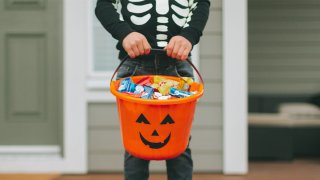
With the coronavirus showing few signs of slowing down as fall nears, many are questioning what the next few months will look like as the pandemic continues to decimate traditions and beloved events.
Will there be candy in store for kids? Costumes? Apple picking?
Dr. Mark Loafman, chair of family and community medicine at Cook County Health, said Halloween may not be gone entirely, but things will certainly look different.
Loafman, who said the holiday was already a tricky subject for doctors as they work to battle an obesity epidemic, said the coronavirus brings even more challenges to the table.
"That's something we always struggle with regardless of COVID anyways, you know, encouraging families to find healthier ways to celebrate and to not sort of put candy and really empty calorie food up on such an altar to be celebrated. So that's sort of a backdrop so I think from a public health point of view where we always want to help families address opportunities to find other ways to celebrate it and, you know, the risks associated with that," Loafman said. "Now we have this COVID environment where people getting close together and in a celebratory way is one of our biggest challenges right now."
Trick-or-treating brings with it its own set of obstacles, but maintaining small groups and proper hygiene can ensure families are still able to celebrate, Loafman said.
"What we recommend is you know families get together, so it's safe houses where we know who's going to be going where and we know people are following the protocols and is celebrating, dressing up and the other occasions that would be useful, and good family traditions and that sort of thing," Loafman said. "We try to focus on healthy snacks, try to focus on teaching children safe ways to communicate and how to enforce public health principles. I think we anticipate living with this virus for quite a while and maybe indefinitely and we really have to learn how to retrain all occasions and all events to be able to do it in a safe way so this is an opportunity to do that."
When it comes to proper ways to dish out candy, there are challenges that come with multiple options.
"It would be good to know that the people that are preparing the candy are doing it in a way that's hygiene related and then safe for the kids so I think having a container out that we feel confident was prepared appropriately and then letting kids pick it up, but again, the issue then is that they're all putting their hands in this bowl," Loafman said. "So, you know, individual would be safer, individual handouts in some way so that there wasn't a common bowl everybody's reaching into- I think that's probably a risky scenario."
But fall doesn't just mean trick-or-treating. It also means hay rides, pumpkin patches and other seasonal treats.
According to Loafman, it's not necessarily what you do that you need to worry about, it's how you do it.
"It's small groups keeping distance, it's wearing masks and these things can absolutely happen and getting outdoors is, you know, safe and able to do when it's done in those constructs," Loafman said. "We want to avoid people getting into a situation where they don't have control of their surroundings and people that maybe are lax about their mask use and their hygiene are going to contaminate others. I think the best way to take care of our families is to not get ourselves in those situations where we lose control, and it becomes a spreading event."
The biggest risk, according to Loafman, is such activities becoming "super spreading events."
"Watch your distance, wash your hands and then wearing masks, those are the big three things for any kind of public activity, and you know whatever is done needs to be done in that way when those three things can be maintained," Loafman said. "And when we do that, we have very good luck controlling the spread of this virus and when we don't do those things we get spread and when it's a congregate event where there's a lot of people coming we get super spread. And that's what's really, really killing us right now is the fact that we don't just have low level one-to-one transmission but we get events where one person infects five and they infect 20 and then you get 100 before you know it. That's what we have to stop if we ever want to get get through this."
Loafman predicts many things may need to be adjusted as the world continues to deal with the coronavirus pandemic.
"This is no different than where we don't let our kids go on a road trip with parents who don't believe in seatbelts," Loafman said. "And we don't want to consider a secondhand smoke and, you know, we've relearned a lot of things about how to change the way we parent and just a constant evolution of that and I think this is just another phase of that."

